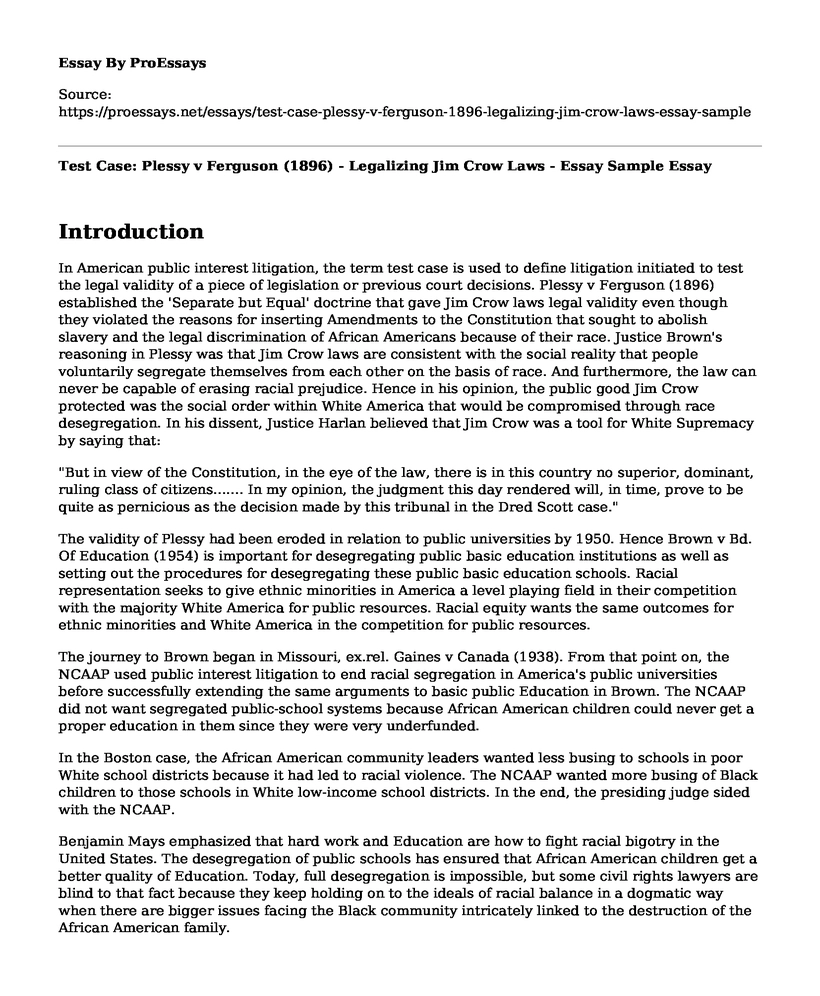Introduction
In American public interest litigation, the term test case is used to define litigation initiated to test the legal validity of a piece of legislation or previous court decisions. Plessy v Ferguson (1896) established the 'Separate but Equal' doctrine that gave Jim Crow laws legal validity even though they violated the reasons for inserting Amendments to the Constitution that sought to abolish slavery and the legal discrimination of African Americans because of their race. Justice Brown's reasoning in Plessy was that Jim Crow laws are consistent with the social reality that people voluntarily segregate themselves from each other on the basis of race. And furthermore, the law can never be capable of erasing racial prejudice. Hence in his opinion, the public good Jim Crow protected was the social order within White America that would be compromised through race desegregation. In his dissent, Justice Harlan believed that Jim Crow was a tool for White Supremacy by saying that:
"But in view of the Constitution, in the eye of the law, there is in this country no superior, dominant, ruling class of citizens....... In my opinion, the judgment this day rendered will, in time, prove to be quite as pernicious as the decision made by this tribunal in the Dred Scott case."
The validity of Plessy had been eroded in relation to public universities by 1950. Hence Brown v Bd. Of Education (1954) is important for desegregating public basic education institutions as well as setting out the procedures for desegregating these public basic education schools. Racial representation seeks to give ethnic minorities in America a level playing field in their competition with the majority White America for public resources. Racial equity wants the same outcomes for ethnic minorities and White America in the competition for public resources.
The journey to Brown began in Missouri, ex.rel. Gaines v Canada (1938). From that point on, the NCAAP used public interest litigation to end racial segregation in America's public universities before successfully extending the same arguments to basic public Education in Brown. The NCAAP did not want segregated public-school systems because African American children could never get a proper education in them since they were very underfunded.
In the Boston case, the African American community leaders wanted less busing to schools in poor White school districts because it had led to racial violence. The NCAAP wanted more busing of Black children to those schools in White low-income school districts. In the end, the presiding judge sided with the NCAAP.
Benjamin Mays emphasized that hard work and Education are how to fight racial bigotry in the United States. The desegregation of public schools has ensured that African American children get a better quality of Education. Today, full desegregation is impossible, but some civil rights lawyers are blind to that fact because they keep holding on to the ideals of racial balance in a dogmatic way when there are bigger issues facing the Black community intricately linked to the destruction of the African American family.
Cite this page
Test Case: Plessy v Ferguson (1896) - Legalizing Jim Crow Laws - Essay Sample. (2023, May 04). Retrieved from https://proessays.net/essays/test-case-plessy-v-ferguson-1896-legalizing-jim-crow-laws-essay-sample
If you are the original author of this essay and no longer wish to have it published on the ProEssays website, please click below to request its removal:
- Technological Device Influencing Traditional Communication Styles of Men and Women
- Essay Sample on Cyber Crime and Cyber Security
- Literary Analysis Essay on "A House of My Own" by Sandra Cisneros and "Shooting an Elephant" by George Orwell
- Literary Analysis Essay on Romeo and Juliet: A Reflection of Today's Evil Society
- Emergency Physicians: Ethical Dilemmas & Decision-Making - Essay Sample
- Paper Example on Eileen's Frustration With Geoffrey's Arrogance in Interpersonal Relations Workshop
- Essay on Buddhism in Japan: Origins & Impact on Society







